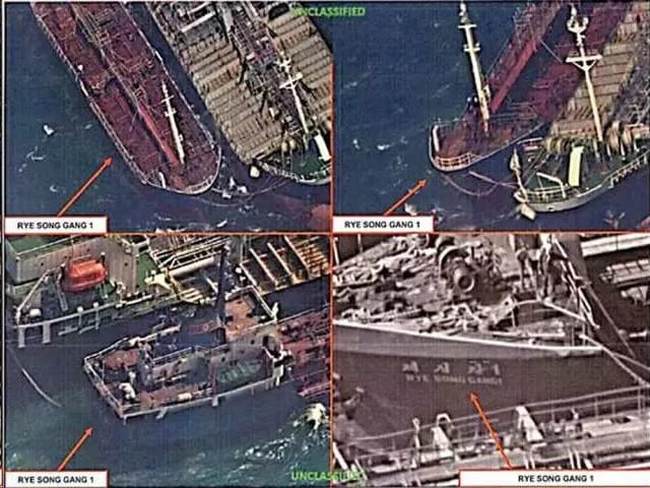
Two days ago, the South Korean government announced it had seized and impounded the 11,253-ton Hong Kong-registered tanker, the Lighthouse Winmore, for violating UN imposed sanctions against North Korea. In October, the Lighthouse Winmore, owned by a Taiwanese company, took on a load of fuel in South Korea ostensibly bound for Taiwan. The ship then had a rendezvous with three other ships in international waters. One of them was a North Korean ship that the US has asked the UN to place under sanctions. The Lighthouse Winmore off-loaded its fuel and returned to port. Unfortunately, it was under surveillance and the ROK Navy seized the ship and crew.

The U.S. Treasury Office released images taken on October 19, 2017, depicting a reported attempt by Korea Kumbyol Trading Company’s vessel Rye Song Gang 1 to conduct a ship-to-ship transfer, possibly of oil, in an effort to evade sanctions. U.S. Office of Foreign Assets Control
#BREAKING: Pictures of Hong Kong-flagged oil tanker Lighthouse Winmore that transferred refined petroleum products to a North Korean ship and was captured by South Korean Navy pic.twitter.com/OmnHyEdKke
— Amichai Stein (@AmichaiStein1) December 29, 2017
Caught RED HANDED – very disappointed that China is allowing oil to go into North Korea. There will never be a friendly solution to the North Korea problem if this continues to happen!
— Donald J. Trump (@realDonaldTrump) December 28, 2017
Now the South Korean navy has announced a second seizure (not the Kurt Eichenwald type seizure, the navy type).
South Korean authorities have seized a Panama-flagged vessel suspected of transferring oil products to North Korea in violation of international sanctions, a customs official said on Sunday.
The seizure was the second to be revealed by South Korea within a few days, as the United Nations steps up efforts to squeeze essential oil supplies to the reclusive North following its nuclear or ballistic missile tests.
The ship, KOTI, was seized at Pyeongtaek-Dangjin port, the official told Reuters, without elaborating, due to the sensitivity of the issue. The port is on the west coast, south of Incheon.
A marine official also confirmed the seizure, which he said was done “recently”.
The KOTI’s estimated time of arrival at the port was Dec. 19, according to VesselFinder Ltd., a tracking service provider, the ship can carry 5,100 tonnes of oil and has a crew mostly from China and Myanmar, Yonhap News Agency reported, adding that South Korea’s intelligence and customs officials are conducting a joint probe into the vessel.
There are two salient facts to keep in mind here. First, this shows a significant change in the general attitude of the ROK government towards enforcing sanctions. One has to assume that part of this is that they have come to the realization that unless the DPRK can be disarmed peacefully, it will be disarmed by force. Second, it shows that any serious enforcement of UN sanctions could have had a dramatic impact eight or sixteen years ago. The reason sanctions didn’t work is because two administrations decided to kick the can down the road. Seizing ships is not a trivial matter. It levies a significant cost on the owner. Its loss disrupts the usual smuggling pattern. And it deters others from becoming involved.













Join the conversation as a VIP Member